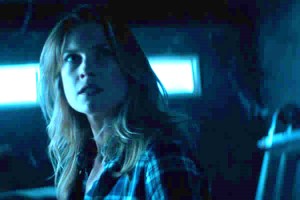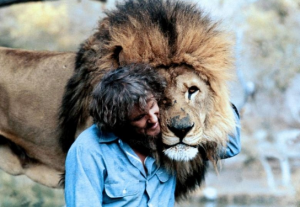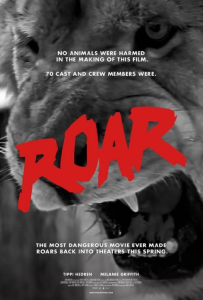SXSW: ‘The Diabolical’ and ‘Roar’ – Learning from Mistakes with Tipi Hedren and Ali Larter
(Originally published on Blogcritics.org)
Not all movies can be winners, but as film fans and writers we can learn something from other people’s mistakes. Two mistakes presented at SXSW Film were The Diabolical, staring Ali Larter (Resident Evil: Extinction Heroes), part of the SXSW Midnighters series, and Roar, staring Tippi Hedren (The Birds, Marnie), part of the SXSW tradition: The Super Secret Screening. (People waiting in line were hoping the Super Secret Screening would be Furious 7.)
Both of these films fall into a super-genre, which screenwriting guru Blake Snyder, in his book Save the Cat, identifies as Monster in the House. In Monster in the House a person or persons are trapped in a restricted area – a house, a cave, a spaceship, a boat – with a creature or person that wants to do them harm. Within the super-genre, you can find multiple regular genres. Alien, House on Haunted Hilland Jaws are examples.
In The Diabolical, Ali Larter plays a single mom with two children who are tormented by apparitions and objects flying around. They try to leave, but can’t because strange, life-threatening things begin to happen to the kids. She calls on paranormal experts, but they are scared away without telling her anything. She turns to her kids’ science teacher, who becomes her boyfriend, and he agrees to help.
This is where things start to go wrong. The film is billed – check the name – as a supernatural thriller. None of the apparitions at the beginning of the film are particularly scary. Then, when her boyfriend shows up with scientific instruments, he determines that this is not spirits and poltergeists, but a teleportation experiment gone wrong. Who’s doing it? The company he used to work for before he became a science teacher.
So we have an audience full of horror movie fans, and we’ve switched genres to sci-fi. Wait, there’s more.
So why don’t we stop this company or call the police? Because, according to science teacher guy, the technology is so advanced, it’s actually coming from the future. Wait! Did anyone see Terminator?
It gets even more Terminator when we discover that the creature being transported through time is single mom’s son. Apparently, this is a result of his unhappy childhood which is going on right now. It gets even more silly and difficult to understand as apparently single mom is somehow transported to the future and maybe she dies but it’s hard to tell.
Lesson: Pick a genre and stick to it, so you don’t disappoint and confuse your audience. This movie was definitely diabolical, but not in a scary way.
Roar, on the other hand, stuck to the Monster in the House super genre. It tells the story of a preservationist, played by Noel Marshall (The Exorcist, The Harrad Experiment), who also produced, wrote and directed. His character studies lions in Africa and fights against the evil hunters. He has been estranged from his wife, played by real world wife Tippi Hedren, and children, played by real life children Melanie Griffith and John and Jerry Marshall. His family journeys to Africa to re-unite with him. However, a playful lion sinks his boat, so their paths do not cross, and the family ends up trapped in his house surrounded and terrorized by nearly a hundred lions.
That was a good Monster in the House set-up. Then things go wrong. He returns to find his family cowered and hiding from the lions, but then explains to them that you just have to be understanding and nice to these creatures and they won’t hurt you.
We are then treated to seemingly endless scenes of the family petting, nuzzling, rolling around on the floor with and, to me at least, becoming uncomfortably intimate with the lions. In the film, none of the lions hurt anyone.
The movie ends with an appeal to be nice to animals, they are our friends, and we shouldn’t be mean to them or shoot them and on and on.
The problem with this film is its fundamental dishonesty. This is not innocent anthropomorphizing of lions as in Wizard of Oz or Narnia. Marshall and family wanted you to believe that what you saw was real. I wonder if the man eaten by a lion whose video appeared on YouTube a few years back had seen this film.
Before the film screened, a rep of SXSW filled the audience in on some facts about the production.
Not only was this not an accurate portrayal of African lions, the only reason they were able to get the shots they did is that Marshall and Hedren had been collecting and familiarizing these lions with their family for eleven years. In spite of that, during the production, 70 members of the cast and crew were injured by lions, including Griffith, who needed reconstructive surgery. Cinematographer Jan de Bont nearly lost his scalp, needing 120 stitches to reattach it. Noel Marshall received injuries from which it took years to recover. He never directed again.
Lesson: Don’t lie to yourself or your audience when making a film, especially if the results can be deadly. Art should equal truth.
Roar will be rereleased April 17. The trailer for the re-release gives details of the injuries some of the cast received. You may want to watch the original 1981 trailer to appreciate the scope of the intellectual fraud involved.






